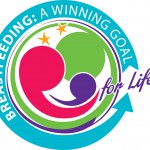Editor’s note: This post was originally published on September 14, 2008. It provides an alternative to commercialized baby food for parents starting their infants and young toddlers on solids.
The first time a friend offered my daughter Violet a veggie “puff,” I was puzzled. “They’re healthy,” she explained. “They’re made from vegetables.” Why not, I wondered, just give her the actual vegetables instead?
Western culture has an unfortunate tendency toward dumbing-down food for kids. Whether it’s for the sake of convenience or the mistaken assumption that kids won’t like cauliflower, it’s more common to see a toddler munching on gummy fruit snacks than a fresh nectarine.
Hoping to encourage an affinity for healthy, whole foods is one reason my husband and I opted to follow an approach I’d read about, baby-led weaning, to introduce Violet to solid food. Instead of offering her the standard rice cereal and purees, we presented her with the real thing from the beginning and let her lead the way.
Baby-led weaning allows the baby to become acquainted with real food in its true form, exploring tastes and textures at her own pace.
Texture is such a pivotal part of the epicurean experience, but purees eliminate that element entirely. Learning to love pureed peas may not translate into an affection for the small, round version that bursts in the mouth.
Baby-led weaning also gives the baby the chance to choose for herself among what is offered — for example, polishing off her yam before moving on to the quinoa, black beans or kiwi — and to be in control of how much she wants to consume, which helps her learn to follow her body’s signals in determining when to stop eating, rather than relying on the person wielding the spoon to decide for her.
From bananas, Violet ventured to other soft foods like avocado, squash and very ripe pears, but she didn’t stop there.
By the time she was 1 year old, she had developed a pretty sophisticated palate enjoying all the same dishes we do: from steel-cut oats with cinnamon and raisins to vegetarian paella, baked ziti with vegetables and mushrooms, and grilled wild Alaskan salmon with rosemary roasted potatoes and steamed broccoli. In a time crunch, we fall back on her favorite spinach, feta and heirloom tomato omelet.
We can’t take all the credit, of course. Violet’s willingness to sample anything we serve is in large part a product of her personality.
But we certainly hope that exposing our daughter to healthy, unprocessed fare at an early age has contributed to her developing a taste for a variety of whole foods, prepared in different ways with different flavors…and that her preference for such delicacies will persist, even in the face of the less nutritionally desirable options she’ll no doubt encounter — and occasionally indulge in, as we all do — someday.

